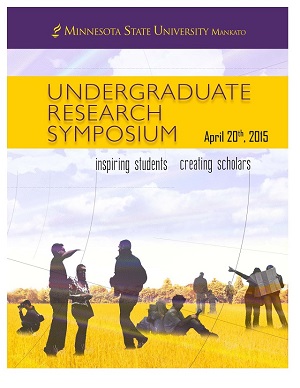Psychology Knowledge Revision Campaign: Assessing Student Learning through a Classroom and Laboratory based Research Project
Location
CSU Ballroom
Start Date
20-4-2015 2:00 PM
End Date
20-4-2015 3:30 PM
Student's Major
Psychology
Student's College
Social and Behavioral Sciences
Mentor's Name
Karla Lassonde
Mentor's Email Address
karla.lassonde@mnsu.edu
Mentor's Department
Psychology
Mentor's College
Social and Behavioral Sciences
Description
Commonsense beliefs are barriers to learning for all sciences but Psychology is especially vulnerable as people have emotionally held beliefs about human behavior. One known method for knowledge revision is to provide learners with refutation information about misconceptions. Refutation-style texts have been considered a viable strategy for changing psychological misconceptions in classroom-based and laboratory studies. The current project aims to integrate teaching with refutation-style information to the preceding laboratory work. Eighteen participants enrolled in psychology courses were administered a pre-test of 20 true/false statements; half the statements were psychology facts and the other were psychology misconceptions (e.g. “men and women communicate in different ways”). Next the participants viewed 10 posters, with each poster being presented by a psychology student as part of their own research course. Posters contained information and graphics that refuted the misconception in an attempt to revise knowledge. Poster presentations resembled the type of information teachers would present in a classroom. After viewing all 10 posters the participants took a post-test in the same true/false format but this time the participant was instructed to explain why he/she chose the answer they did. Seven to ten days later, participants took the post-test again to assess their long-term retention. Data revealed that the refutation-style presentations were successful in revising knowledge for psychology misconceptions. Participants answered more of the psychology misconceptions correct on the post-test survey than the pre-test and this knowledge persisted on the long-term post text. In fact, nearly all participants scored perfectly on the post tests.
Psychology Knowledge Revision Campaign: Assessing Student Learning through a Classroom and Laboratory based Research Project
CSU Ballroom
Commonsense beliefs are barriers to learning for all sciences but Psychology is especially vulnerable as people have emotionally held beliefs about human behavior. One known method for knowledge revision is to provide learners with refutation information about misconceptions. Refutation-style texts have been considered a viable strategy for changing psychological misconceptions in classroom-based and laboratory studies. The current project aims to integrate teaching with refutation-style information to the preceding laboratory work. Eighteen participants enrolled in psychology courses were administered a pre-test of 20 true/false statements; half the statements were psychology facts and the other were psychology misconceptions (e.g. “men and women communicate in different ways”). Next the participants viewed 10 posters, with each poster being presented by a psychology student as part of their own research course. Posters contained information and graphics that refuted the misconception in an attempt to revise knowledge. Poster presentations resembled the type of information teachers would present in a classroom. After viewing all 10 posters the participants took a post-test in the same true/false format but this time the participant was instructed to explain why he/she chose the answer they did. Seven to ten days later, participants took the post-test again to assess their long-term retention. Data revealed that the refutation-style presentations were successful in revising knowledge for psychology misconceptions. Participants answered more of the psychology misconceptions correct on the post-test survey than the pre-test and this knowledge persisted on the long-term post text. In fact, nearly all participants scored perfectly on the post tests.
Recommended Citation
Vergin, Megan; Haley Rohloff; and Molly Kolquist. "Psychology Knowledge Revision Campaign: Assessing Student Learning through a Classroom and Laboratory based Research Project." Undergraduate Research Symposium, Mankato, MN, April 20, 2015.
https://cornerstone.lib.mnsu.edu/urs/2015/poster_session_B/43




